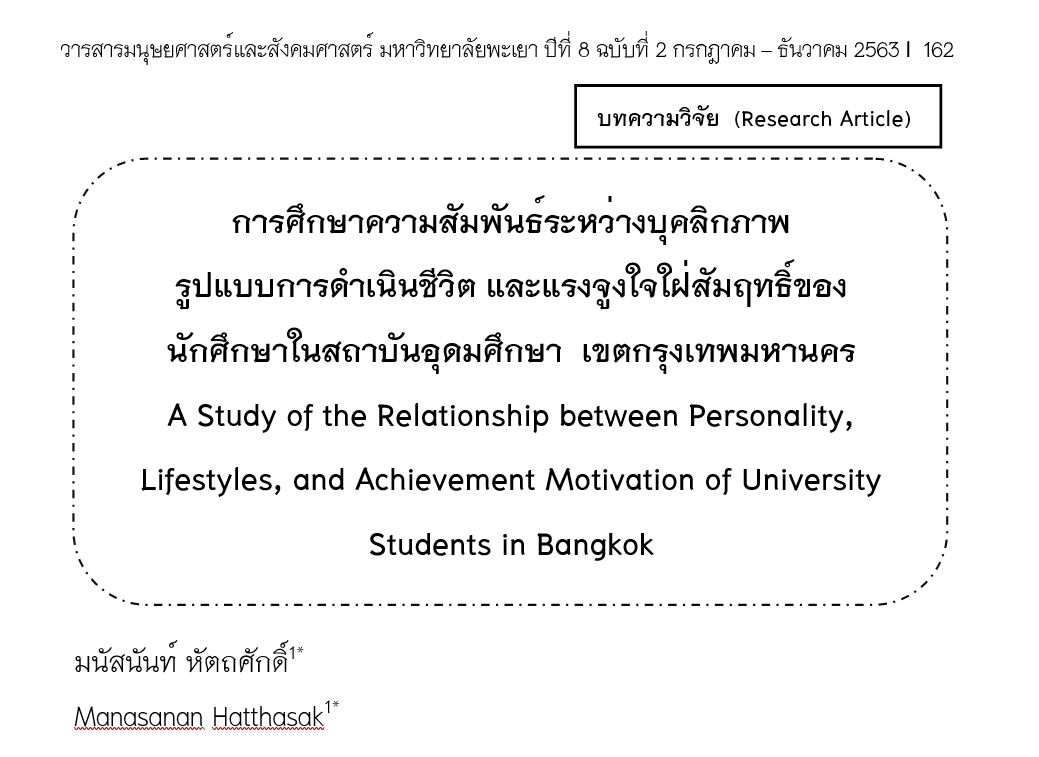A Study of the Relationship between Personality, Lifestyles, and Achievement Motivation of University Students in Bangkok
Keywords:
Personality, Lifestyles, Achievement motivation, StudentsAbstract
The aims of this research is to investigate the relationship between personal data, personality, lifestyles, and achievement motivation of university students and to develop prediction equations of the students’ achievement motivation. The population in this study was university students in Bangkok. A sample of 400 students in academic year 2017 was randomly selected from four universities. The questionnaires with the reliability of 0.87 were implemented to survey their personality, lifestyles, and achievement motivation. Additionally, the data were statistically analyzed using percentage, mean, standard deviation, Product-Moment Correlation Coefficient, and Stepwise Multiple Regression Analysis.
The results reveal that the majority of the respondents was female, that is 227 students or 43.3 percent of the total respondents. The results also show that the majority of the respondents was the first-year students, that is 152 students or 38.0 percent of the total respondents. Regarding the students’ personality, it is found that only neuroticism was at high level, that is 3.55, while the others were at moderate level. Concerning their lifestyles, it is found that all six types of lifestyles were at high level. To be specific, the academic one got the highest mean, which is 3.84. Focusing on the achievement motivations, three types of them were at high level and the ambition in studying got the highest mean at 3.85. By comparing the achievement motivations of male and female students, it is revealed that they have different levels of ambition, enthusiasm, risk management, and identity with the statistical significance at 0.05.
To develop prediction equations of the students’ achievement motivation, I have chosen the third model. I have found that the three best predicting factors with the 0.05 statistical significance include extraversion personality, conscientiousness personality, and neuroticism personality. All those three types of personality together predict the achievement motivation as illustrated in the prediction equations in the form of raw score as follows:
(Achievement Motivation) = .265+ .194 + .139
The Standard Score Ž= .222(Z Extraversion) + .190 (Z conscientiousness) + .121
(Z Neuroticism)
References
ณัฐพรหม อินทุยศ. (2553). จิตวิทยาการศึกษา. เพชรบูรณ์: สถาบันการพลศึกษา วิทยาเขตเพชรบูรณ์.
ประสาท อิศรปรีดา. (2523). จิตวิทยาการเรียนรู้กับการสอน. กรุงเทพฯ: กราฟิกอาร์ต.
ปรียาพร วงค์อนุตรโรจน์. (2553). จิตวิทยาการศึกษา. กรุงเทพฯ: ศูนย์สื่อเสริมกรุงเทพ.
ประสิทธิ์ ทองอุ่น. (2542). พฤติกรรมมนุษย์กับการพัฒนาคน. กรุงเทพฯ: เธิร์ดเวฟเอ็ดดูเคชั่น.
ปริวัฒน์ จันทร์ทรง และ นิตต์อนิล ภูริชอุดมอังกูร. (2561). การศึกษาความคาดหวังและการรับรู้จริงต่อคุณภาพอาจารย์ที่ปรึกษาจากนักศึกษาสาขานิติศาสตร์ มหาวิทยาลัยอุบลราชธานี. วารสารมนุษยศาสตร์และสังคมศาสตร์ มหาวิทยาลัยพะเยา, 7(1), 72-100. ได้จาก: https://so03.tci-thaijo.org/index.php/Humanties-up/article/view/206312
ศิริพร แสงศรีจันทร์และคณะ. (2556). ความสัมพันธ์ระหว่างปัจจัยด้านนิสิต กระบวนการเรียนการสอน ปัจจัยเกื้อหนุน กับความสุขของนิสิตพยาบาล. วารสารมนุษยศาสตร์และสังคมศาสตร์ มหาวิทยาลัยพะเยา, 1(2), 20-28. ได้จาก: https://so03.tci-thaijo.org/index.php/Humanties-up/article/view/42687
แสงเดือน ทวีศิน. (2545). จิตวิทยาการศึกษา. พิมพ์ครั้งที่ 2. กรุงเทพฯ: โรงพิมพ์ไทยเส็ง.

Downloads
Published
How to Cite
Issue
Section
License
ผู้นิพนธ์ต้องรับผิดชอบข้อความในบทนิพนธ์ของตน มหาวิทยาลัยพะเยาไม่จำเป็นต้องเห็นด้วยกับบทความที่ตีพิมพ์เสมอไป ผู้สนใจสามารถคัดลอก และนำไปใช้ได้ แต่จะต้องขออนุมัติเจ้าของ และได้รับการอนุมัติเป็นลายลักษณ์อักษรก่อน พร้อมกับมีการอ้างอิงและกล่าวคำขอบคุณให้ถูกต้องด้วย
The authors are themselves responsible for their contents. Signed articles may not always reflect the opinion of University of Phayao. The articles can be reproduced and reprinted, provided that permission is given by the authors and acknowledgement must be given.







